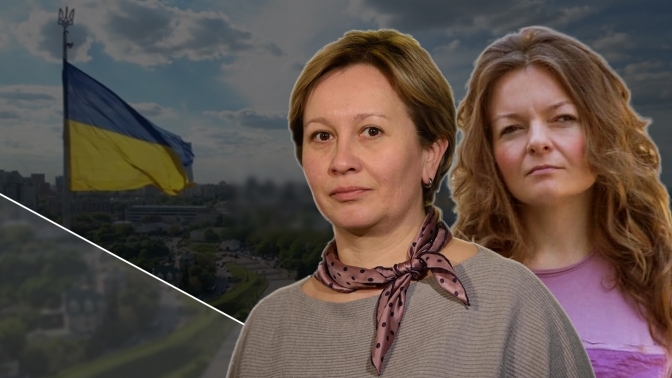
[For urgent updates please follow Ukrainian Freedom News on Telegram]
Let’s talk about culture and war. For people who are at the forefront, culture is also important. An example of this is Roman Ratushnyi, whose death shocked many. On April 22, he wrote that we should take off our pink glasses and burn out from ourselves the Russian subculture, any connection with Russian culture in general, otherwise it will burn us out. This quote already has 13,000 likes. Culture and cultural war – how important are these things now? What means this testament to you?
Iryna Podoliak: For me this war began in 2008, and the latent one has not stopped since 2000, when Putin became president. He felt the possibilities and the pain points, the «calluses» that we could be pressed for. He also understood very well what «erogenous zones» Russian society has, what food should be given to this Moloch [pagan god mentioned in the Bible, to whom human sacrifices were devoted] so that he constantly feels in shape.
So for me, this is a war of cultures. The war of civilizations. Because I personally have never seen culture as just an art. Russia is trying to spread its influence over a vast area of Europe, and we, as representatives of Western civilization, are defending our own because we are self-sufficient. We do not need Russia here.
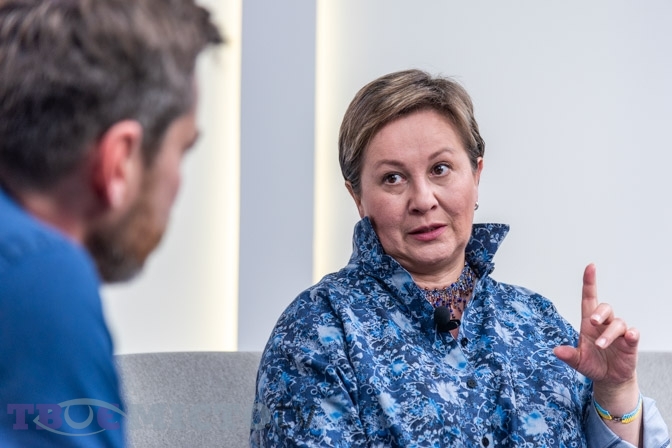
Why do Russians have no tolerance for Ukrainian culture? Should it be completely destroyed?
They have no tolerance for Ukrainian culture, Ukrainians or Ukraine as a state because they see us as their part. There is nothing to talk about with the Russians until the victory in the war. Then you can give 50-60 years off and then talk to the Russians on any topic.
But it is clear that they perceive us as their part. The Russians perceived Ukraine’s declaration of independence as if their arm or leg had been cut off. If we decompose this period, we can easily understand the genesis of this war. Through the leader of the Russians, who uses many means of manipulation, influence, and propaganda, we have received Russia as a huge religious sect. This sect operates and responds to the same principles and laws as totalitarian religious sects: they hear and see nothing.
The statement left by Roman Ratushnyi is addressed to Ukrainians who now live here. How practical is it? Some people today are giving up their Russian identity, moving from Lviv to Mariupol, and starting to speak Ukrainian. Is that enough, and does everything suit everyone?
Oksana Forostyna: It is a bad idea to discuss with Roman now. It is good that his text was recorded at that very moment so that there was no «throwing» at the hero what he did not really say. We had reasons to discuss this before and, unfortunately, there will be more. But as for those people who are in pain to change something in themselves, our Western friends have a very good phrase in this case: «Test your privileges.» To what extent do the things they do not want to give up is their privilege.
This is a huge question, which I formulate for myself as «after this war.» Can we hope for any cultural revival, and what will we put in these words?
I think after the war we can hope for a very big collective trauma and a lot of terrible memories. Because people have not yet begun to speak out, we are still «inside the volcano». We will hear a lot of terrible things.
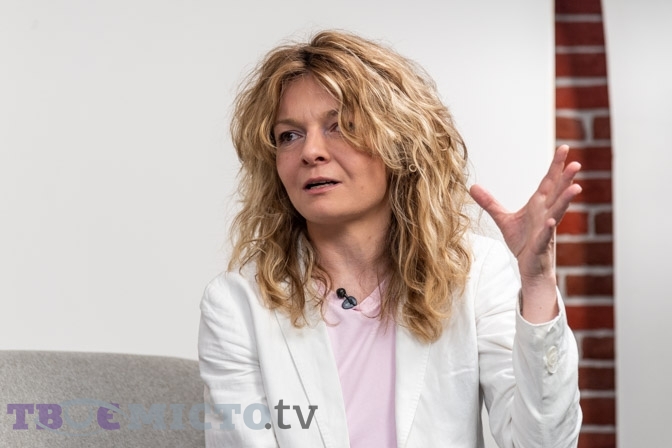
Please comment on Arestovych’s words that Ukraine wants to build a big country with a small culture: «This small culture is only suitable for such a small and monoethnic state as Hungary. Ukraine is not such a country. And unification, no matter what the war, no matter what patriotic slogans, no matter how much you want to forget as many Russian words as possible – all these arguments are not serious, but the trend behind it is worth attention. While I am here, I will not allow Ukraine to build a big country with a small culture. I will try to make it a multicultural country.»
Iryna Podoliak: He believes that Hungary is a monocultural country and Ukraine is not. The fact is that no one has ever denied that Ukraine is a multicultural, multiethnic state. In fact, the formation of a nation-state, not an ethnic one, is coming to an end. We have many ethnic groups, and many ethnic groups are the bearers of their culture. No. We are completing the formation of a nation-state, where nationality is a political concept, so there is little to comment on.
Read also: Russian music will disappear for long, if not forever
Ukrainian culture has not declined. It may have been forgotten, not properly understood, and studied as the Russians and Germans explored their culture. But this process has begun and continues quite successfully. And we see how many of our people are now traveling in Europe and the United States, forming meanings, beginning to correct the optics that we have to go through this postcolonial path and revision.
Therefore, I am very optimistic about Ukrainian culture and believe that it is on the way back to the common partnership table.
Oksana Forostyna: The question is what they want to «sell» us with all this talk about big and small cultures. Because then there was the thesis that we need to take smart people from Russia, because we seem to have a demographic gap and we need to take the best from there. It is a fact that we will have demographic problems. But from a person close to the government, I would like to hear how we are going to bring our people back from Russia, who are now deported, some in filtration camps, some in the Far East.
I understand that such things are resolved quietly, that no one will tell us the mechanisms of how to get «out of there.» But so far we have not decided on these problems, saying that Ukraine will need 300,000 Russian IT workers, would be at least cynically.
Iryna Podoliak: It was all during the Second World War – an exchange of identity. This is how the biggest problems arose in the Baltic countries. There, almost half of the population was deported to Siberia, instead of them Russia brought its people there.
This was also the case in Ukraine. Both in Lviv and in the Crimea. And what did it all lead to? To close one line – Ukraine in a terrible, tragic war, in an incredible meat grinder, we are used with our consent as a frontier. And we agreed to it, and defend ourselves, close Europe.
We cannot now reflect, feel sorry, look for «good Russians». Are they there? Undoubtedly there are. Or there are a few, or tens, maybe even hundreds of them. However, we have no time to think about them. We need to think about children, those who have been forcibly deported, how to help the government provide an army, how to conduct highly intelligent discussions with the West, which understands nothing about Russia in the context of postcolonial discourse, and change it, influence it.
We must ensure that Slavic studies in all major universities are not Russian. We have a lot of important work to do that will contribute to our «identity», our sovereignty, independence and our victory in the war.
And only a cynic can invite different kinds of Russians here. This is not on time and has never been on time. Now is not the time for Ukrainians to be tolerant, to reflect, to look for some «cat in a dark room», especially if he is not there.
We have priorities. People often asked me about Russians who want to help Ukraine, want to speak out and say in the West that Putin and the war are bad. However, this is still a «big brother» complex that seems to support you.
In my opinion, if there are any Russians who really want to help Ukraine, and not just save themselves from the discomfort caused by the Putin regime and sanctions, they should remain silent, apologize and not go on our air.
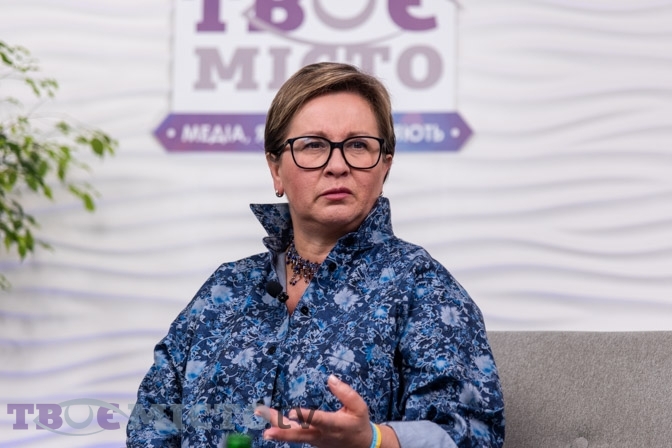
But they are also present in Ukrainian culture and subculture. Sometimes. Let’s watch the video of Ukrainian artists touring abroad...
This is also a question about «good Russians», because one of the first to perform on stage in this video was Mr. Zhydkov [the screenwriter for the «Kvartal 95» studio]. He is already a Ukrainian citizen who also received a Ukrainian passport under a very simplified procedure. How should we treat this? Why do we speak Russian if we are Ukrainians?
Oksana Forostyna: In many cases here in Ukraine, we are talking about language, culture and identity. And when it comes to granting citizenship to Russians, one must immediately understand the context of the conversation. I don’t see anything wrong with granting citizenship to Russians who have spent time in prison for political reasons or are now helping Ukrainians. Someone is now helping deported Ukrainians flee Russia through Estonia or Georgia.
We will probably never know the names of these people, but no one is saying that they should be granted citizenship. Instead, they say that celebrities need citizenship, who say on TV that they will somehow be helpful to us.
This means for me that a certain number of Russians have reserved seats in the authorities. I mean symbolic power. Because the entertainment sphere, media, and journalism are also the power.
Iryna Podoliak: Friedman is currently being debated. And it is wild when we ask the West to impose sanctions, Friedman falls under sanctions, and Ukraine is considering granting him Ukrainian citizenship. I hope that will not happen.
We have the right to boycott all this until the end of the war [Russian – Ed.].
There is an interesting cultural phenomenon called the Freedom of Russia Legion. We may have a completely different view on this topic. We may mention Vlasov’s army, the Nachtigall, but intelligent historians already told us that this is a completely different war, and that we should not use World War II terminology.
Read also: «We came back to 1944.» Vitaly Portnikov about the lessons of World War II
This is a legion of Russian professional soldiers who are fighting on the side of Ukraine. I do not believe this. I also believe in the strength of the FSB school. I believe this because they have been around for decades. The FSB operates very professionally, it has integrated into all spheres of life in Ukraine a huge number of people who are agents, sympathizers, infiltrated into different environments.
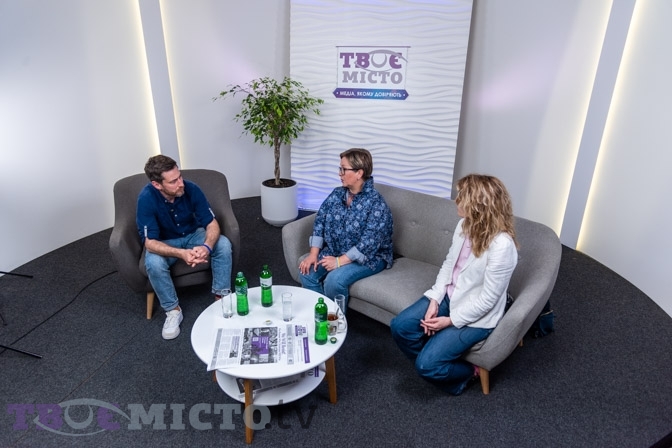
Thus, Russian culture existentially threatens Ukrainian culture. I would very much like us to be able to separate Ukrainian from Russian so that it is no longer in touch. How can we get there?
Iryna Podoliak: All that ordinary people expect is a proposal from public authorities. If a nationwide or nationwide grand narrative is proposed, it is necessary for someone to verbalize it. Only totalitarian authorities could identify certain elements and push them to make millions believe in it. In democracies, the government invites smart people and advises what could be offered to the people. The President has great support, and he should propose the subject of this grand narrative for public discussion.
Our problems are often from the fact that we take some steps too quickly. Instead, it would be worth discussing with society in different strata and platforms, mixing environments.
Any thesis that comes from the presidential, ministerial or intellectual environment is criticized. There are no problems with this. We give a vision – there will be opponents. But the government must offer this vision. Several theses which will help society survive and see development. It is impossible otherwise. Initiatives about de-russification are important, but whether they can be implemented is a question.
There is an intention from the Ukrainian Book Institute that we need to clean our library funds. It’s true. We need to do this. There is a lot of peer-reviewed Soviet and Russian literature. There is no balance between Russian and other literature.
However, books are purchased from libraries at the expense of taxpayers, and state institutions have been set up for this purpose, to which we have delegated certain functions. They have the right to decide at public expense how to renew library collections. In addition, I am not convinced that attacks on the law «on the state language» will weaken.
Oksana Forostyna: I return to my favorite question of hierarchy and power. The question is not whether Chekhov and Pushkin are in the school curriculum, the question is what proportions. Oleksiy Panych wrote about this very well: our approach to teaching literature at school is wrong in that it gives people the idea that they have already got acquainted with all the best at school, and the rest – so-so.
Until we break this scheme, we need to radically change the proportions. It cannot be so numerous in the world literature program, because it is not objectively.
Iryna Podoliak: This is already changing. At the end of last week, I saw published changes to the program of foreign literature in grades 5-11. There are good changes.
Oksana Forostina: Yes, I also read and was shocked by how much was left there. It is said about the same proportions. The reason for this imbalance is very trivial, it is not ideological. Many teachers of Russian literature remained in schools, they had to retrain.
Iryna Podoliak: There was separate Ukrainian, Russian and foreign literature in Soviet schools. I must agree that when we returned to the Ukrainian language and literature, a very large number of teachers of Russian literature had no work. It was even in my school. And they automatically became teachers of foreign literature, and then said: «What’s the matter? Russian literature is foreign.»
Andriy Saichuk spoke
Text: Roman Tyshchenko-Lamanskyi, translated by Kateryna Bortniak
Photo: Tvoe Misto / Ivan Stanislavskyi
Follow us on Facebook and Instagram. Lviv Now is an English-language website for Lviv, Ukraine’s «tech-friendly cultural hub.» It is produced by Tvoe Misto («Your City») media-hub, which also hosts regular problem-solving public forums to benefit the city and its people.












